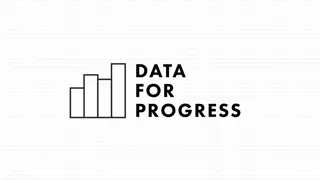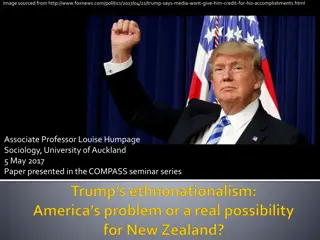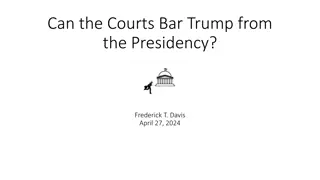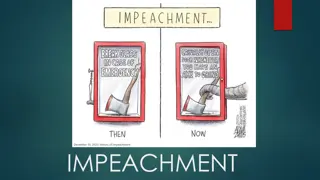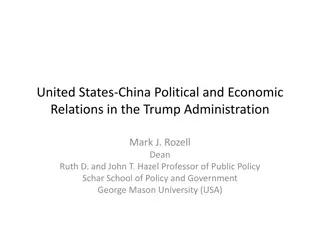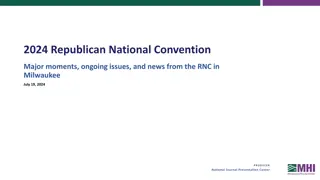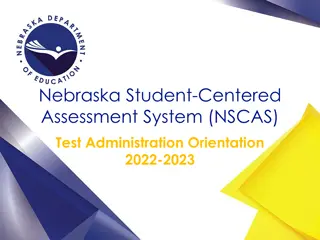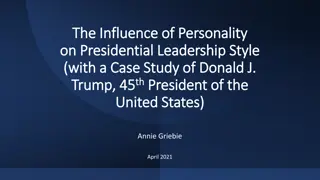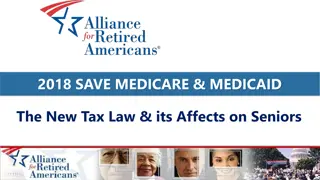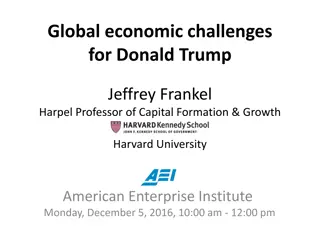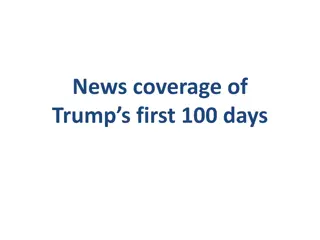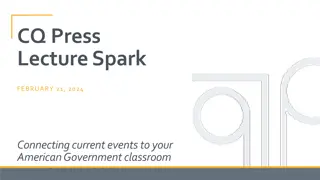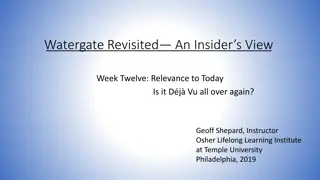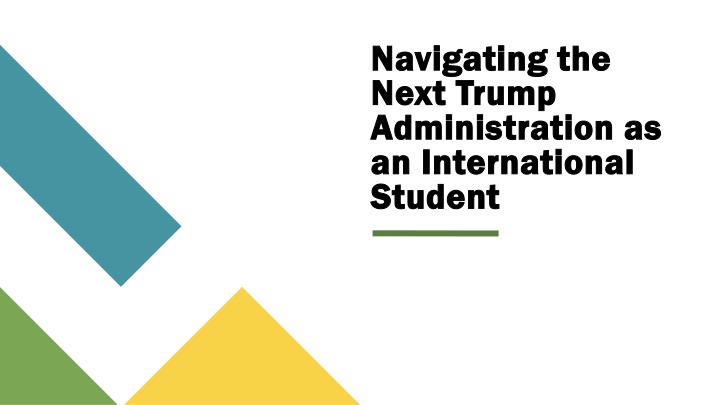
Navigating the Next Trump Administration as an International Student
This presentation delves into the U.S. immigration environment, covering the key laws, policies, and agencies involved. It explores the impact of recent legal developments on regulatory changes and updates, providing insights for international students navigating potential changes under the next Trump administration.
Download Presentation

Please find below an Image/Link to download the presentation.
The content on the website is provided AS IS for your information and personal use only. It may not be sold, licensed, or shared on other websites without obtaining consent from the author. If you encounter any issues during the download, it is possible that the publisher has removed the file from their server.
You are allowed to download the files provided on this website for personal or commercial use, subject to the condition that they are used lawfully. All files are the property of their respective owners.
The content on the website is provided AS IS for your information and personal use only. It may not be sold, licensed, or shared on other websites without obtaining consent from the author.
E N D
Presentation Transcript
Navigating the Navigating the Next Trump Next Trump Administration as Administration as an International an International Student Student
Your Presenters Your Presenters Brad Hendrick, Attorney, Caplan & Earnest LLC Brad Hendrick, Attorney, Caplan & Earnest LLC bhendrick@celaw.com bhendrick@celaw.com | (303) 443 | (303) 443- -8010 8010 Breanne P. Johnson, Attorney, Curray York & Associates, LLC Breanne P. Johnson, Attorney, Curray York & Associates, LLC Breanne.johnson@cyavisalaw.com Breanne.johnson@cyavisalaw.com | (303) 407 | (303) 407- -4100 ext. 319 4100 ext. 319 Kristin A. Knudson, Senior Attorney, Knudson & Associates Kristin A. Knudson, Senior Attorney, Knudson & Associates kristin@knudsonandassociates.com kristin@knudsonandassociates.com | (303) 974 | (303) 974- -7758 7758
Agenda Agenda U.S. Immigration Environment U.S. Immigration Environment Immediate Considerations Immediate Considerations Within the Next Year Within the Next Year Longer Longer- -Term Considerations Term Considerations Takeaways Takeaways Q & A, if time permits Q & A, if time permits
U.S. U.S. Immigration Immigration Environment Environment
U.S. Immigration Environment U.S. Immigration Environment U.S. immigration law and policy come from many different sources and are overseen by several agencies. The Immigration and Nationality Act (INA) was enacted in 1952. The most recent comprehensive amendment to the INA, which strengthened enforcement and increased penalties for undocumented immigrants, was made in 1996. Immigration is primarily a federal government issue. States and local governments play a limited role. For many U.S. voters, immigration is an important issue second only to the economy. Most changes to immigration-related rules and policies will take time, but sometimes things change very quickly. A President cannot do whatever he wants. There are administrative, legal, and political processes that may put limits on some proposals.
Congress has passed few substantive laws in recent years. That gave agencies power to interpret existing law to do what the president or an agency head wanted to do. However, recent Supreme Court rulings have limited the power of federal agencies by overturning precedent that forced courts to defer to agency interpretations of regulations. Courts are now likely to be more aggressive in second-guessing agency interpretation. Regulatory Changes Regulatory Changes & Updates to & Updates to Policies and Policies and Procedures Procedures
Executive Branch agencies are responsible for executing laws passed by Congress. Making and changing rules for programs and policy is a lengthy and complicated process. There are detailed legal requirements for drafting new proposals, conducting reviews, gathering public comments, making changes, and conducting further reviews. Changes can easily take two years, often more. Regulatory Changes Regulatory Changes & Updates to & Updates to Policies and Policies and Procedures Procedures
Executive Branch Agencies Involved in Executive Branch Agencies Involved in Immigration Immigration Immigration and Customs Enforcement (ICE) Student & Exchange Visitor Program (SEVP = a subdivision of ICE) U.S. Citizenship & Immigration Services (USCIS) U.S. Department of Labor (USDOL) Customs and Border Protection (CBP) U.S. Department of State (DOS)
Immigration Environment in 2025 Immigration Environment in 2025 During his 2024 campaign, Trump positioned himself as a champion of legal immigration, distinguishing between those who enter the United States lawfully and those who do not. He even promised to issue green cards to all foreign students upon graduation as part of his "Day One" agenda. Trump has committed to Securing the U.S. border. Reducing undocumented immigration. Enhancing enforcement efforts inside the U.S. Increasing scrutiny of legal immigration pathways.
Immediate Immediate Considerations Considerations for for International International Students Students
We Want You Here! We Want You Here! We recognize that international students studying at U.S. colleges and universities contributed $43.8 billion and supported 378,175 jobs to the U.S. economy during the 2023-2024 academic year. We also know that your contributions go far beyond economics. Your presence helps to create the dynamic learning environment that is highly valued by students, faculty, and staff at Colorado Colleges and Universities. Your backgrounds and perspectives enrich classrooms campuses, and communities. Colorado needs you to contribute highly-skilled labor to our economy.
Credible Sources of Information Credible Sources of Information Your school s Designated School Officials (DSOs) and Alternate Responsible Officers (AROs) Experienced immigration attorneys NAFSA: Association of International Educators - https://www.nafsa.org/ American Immigration Lawyer s Association - https://www.aila.org/ Student & Exchange Visitor Program Study in the States - https://studyinthestates.dhs.gov/ US Citizenship & Immigration Services - https://www.uscis.gov/ US Department of State - https://www.state.gov/ US Customs and Border Protection - https://www.cbp.gov/
Executive Orders Executive Orders Executive orders are official directives by the President of the United States who manages the operations of the federal government. They do not require approval from Congress. While the President has considerable power, orders must be in line with the Constitution and federal laws. Limitations of Executive Orders Limitations of Executive Orders Executive orders can be challenged in court. Congress can cut off the funding needed to carry out the executive order. Future presidents can amend or rescind a previous president s executive order.
Travel Bans Travel Bans President-elect Donald Trump promised to implement mass deportations and take other actions on Day 1 through executive orders. Trumps previous travel bans were implemented using executive orders. Travel bans limit entry by people who are currently outside the U.S. They don t impact those who are already inside the U.S. Countries targeted during Trump s first presidency included Iran, Libya, North Korea, Syria, and Somalia. Different or additional countries could be targeted if Trump puts new travel restrictions in place. If you will be traveling outside the U.S. over the winter break, consider reentering the U.S. before January 20, 2025.
U.S. Visas U.S. Visas Remember that you only need a valid visa stamp to GET INTO the U.S. Once you are here, your lawful presence is shown by your valid passport, I-94, and valid I-20, DS-2019, or other immigration document. Students who need U.S. visas should prepare for even longer waits for visa appointments and for additional administrative processing delays. What you can do: Request your I-20 or DS-2019 as early as possible. o Consider applying for your visa at another U.S. Embassy or Consulate. o Request an expedited visa appointment. o Ask your school for help. o
Maintain Your Status Maintain Your Status Know the rules and understand what you need to do to maintain your status. Enroll Full-Time. Request and obtain reduced course load approval IN ADVANCE. Engage only in authorized employment. No Marijuana! While Colorado allows use/possession, federal law prohibits it.
Employment Employment Any employment while you are in F-1 or J-1 status is likely to receive more scrutiny. Now may not be the time to take unnecessary risks. On On- -campus employment campus employment Accept only positions that meet the definition of on-campus employment. This definition may be different depending on your specific school/campus. 20 hour/week limit while school is in session. Take this seriously and track your own hours.
Employment Employment Curricular Practical Training Curricular Practical Training Familiarize yourself with your institution s policies and procedures on internships. Expect that each institution s policies will be different. Know the CPT process and timeline. Optional Practical Training Optional Practical Training Make sure that jobs are truly related to your field of study. Consider keeping more documentation related to your classes such as course syllabi, papers, and projects. Know and comply with all reporting requirements. STEM OPT Extensions STEM OPT Extensions Work with employers to craft strong I- 983 training plans. Employers must understand and comply with prevailing wage requirements. Employers and employees should be prepared for site visits.
Within the Next Within the Next Year Year
Changes of Status Changes of Status Those in more vulnerable immigration statuses, Those in more vulnerable immigration statuses, to include DACA, TPS, and humanitarian parole, to include DACA, TPS, and humanitarian parole, should explore options to legally change their should explore options to legally change their status. status. If you are in F If you are in F- -1 status and on OPT, will your 1 status and on OPT, will your employer consider sponsoring you for an H employer consider sponsoring you for an H- -1B? 1B? If you have an H If you have an H- -1B, would your employer consider 1B, would your employer consider sponsoring you for permanent residency? sponsoring you for permanent residency? Do you have family Do you have family- -based options? based options?
Longer Timelines, Greater Longer Timelines, Greater Costs, Less Certainty Costs, Less Certainty International students should anticipate greater uncertainty with respect to immigration-related processes. They should prepare for additional costs, including for engaging immigration counsel and premium processing fees. Applications for immigration benefits like changes of status, OPT, and reinstatement that require USCIS review/approval will likely take longer and be subject to greater scrutiny.
Travel Travel Reentry into the U.S. following international travel could Reentry into the U.S. following international travel could become more time become more time- -consuming with greater scrutiny. consuming with greater scrutiny. While international students in F and J status are likely While international students in F and J status are likely to be exempted from outright barriers to entry (e.g., to be exempted from outright barriers to entry (e.g., Muslim bans), these restrictions can contribute to an Muslim bans), these restrictions can contribute to an environment that may initially feel environment that may initially feel less less welcoming. welcoming.
Longer Longer- -Term Considerations Considerations Term
We Dont Know What Will Happen We Don t Know What Will Happen We do know what happened during the previous Trump Administration. Travel Bans/prohibitions on entry targeting specific groups Increased Requests for Evidence (RFEs) and denials of petitions and applications Increased scrutiny/security vetting at consulates and USCIS China Initiative Public Charge Rule Increased funding for and focus on enforcement
Navigating Change Navigating Change The same change can have both positive and negative aspects at the same time. Even positive change can be disruptive. Your goal should be to understand what is happening and how it will impact you.
The Wrong Help Can Hurt The Wrong Help Can Hurt Immigration law is one of the most complicated areas of law in the U.S. Immigration-related issues often require in-depth research and/or consultation with colleagues and/or immigration counsel. International students must deal with complex immigration regulations, institutional policies, AND the interplay of these regulations and policies with each other. Getting things right means that ISSS professionals and immigration attorneys must balance the speed of a response with the accuracy and detail of that response. Immigration issue are often intensely situational. The best course of action can depend on where someone is from, what immigration status they hold/have held, personal and family circumstances, and exactly when events happened or will happen. Many people (including professors) may have personal experience with immigration processes and may be eager to offer advice. GET A SECOND OPINION. The consequences of bad advice or a misunderstanding can be both serious and long-term. What your friend did may not be the right thing for you to do and could have serious consequences. For example, accumulating unlawful presence of 180 days to 364 days triggers a 3-year bar to admission into the U.S.
What YOU Can Do to Prepare What YOU Can Do to Prepare Keep complete records all immigration-related documents, including work authorizations, in a safe and accessible place. Plan your own immigration pathway early and be prepared for contingencies. Document your academic and professional achievements. Give yourself plenty of time to conduct research and take any required actions. Keep your resume/CV up-to-date. Remember that the earlier you ask for help, the more options will be available. Be able to articulate your value to employers. Learn about the immigration processes, eligibility requirements, timelines, quotas and costs. Plan for any relevant fees.
Takeaways Takeaways Focus on what you can control. Get started early whenever possible. Look to trusted and credible sources of information. Be as flexible as possible. Look for what is positive about the change.
Thank You! Thank You! We ll use the remaining time to respond to questions. We ll use the remaining time to respond to questions.
Additional Useful Links Additional Useful Links Student & Exchange Visitor Program Study in the States - https://studyinthestates.dhs.gov/ Executive Orders - https://www.federalregister.gov/presidential- documents/executive-orders Study in the States Practical Training Information - https://studyinthestates.dhs.gov/students/work/applying-for- practical-training Visa Appointment Wait Times - https://travel.state.gov/content/travel/en/us-visas/visa-information- resources/wait-times.html USCIS Optional Practical Training Information - https://www.uscis.gov/working-in-the-united- states/students-and-exchange-visitors/optional-practical- training-opt-for-f-1-students Foreign Affairs Manual - https://fam.state.gov/ (See Section 9 FAM Visas) Study in the States STEM OPT Help Hub - https://studyinthestates.dhs.gov/stem-opt-hub USCIS DACA - https://www.uscis.gov/DACA I-983 Extension Training Plan - https://www.ice.gov/doclib/sevis/pdf/i983.pdf USCIS Humanitarian Parole - https://www.uscis.gov/humanitarian/humanitarian_parole USCIS H-1B -https://www.uscis.gov/working-in-the-united- states/h-1b-specialty-occupations


